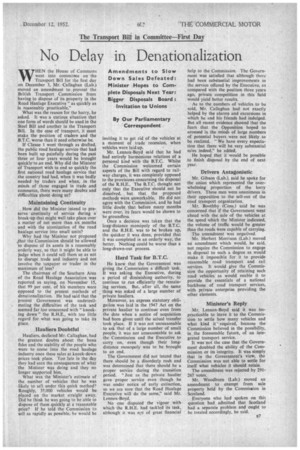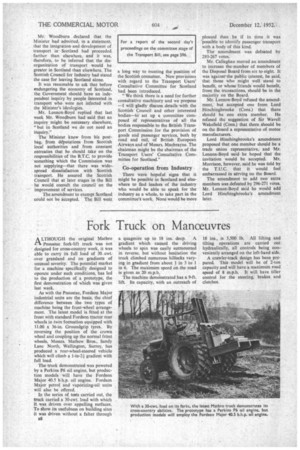The Transport 13111 in Committee—First Day
Page 41

Page 42

If you've noticed an error in this article please click here to report it so we can fix it.
No Delay in Denationalization
Amendments to Slow Down Sales Defeated; Minister Hopes to Complete Disposals Next Year: Bigger Disposals Board : Invitation to Unions By Our Parliamentary Correspondent
WHEN the House of Commons went into committee on the Transport Bill for the first day on December 3, Mr. Callaghan (Lab.) moved an amendment to prevent the British Transport Commission from having to dispose of its property in the Road Haulage Executive "as quickly as is reasonably practicable."
What was the reason for the hurry, he asked. It was a curious situation that one form of words should be used in the Steel Bill and another in the Transport Bill. In the case of transport, it must make the position of traders and the B.T.C. worse than it need otherwise be.
If Clause 1 went through as drafted, the public road haulage service that had been built up painfully during the past three or four years would be brought quickly to an end. Why did the Minister of Transport wish to end so quickly the first national road haulage service that the country had had, when it was badly needed by traders and when, in the minds of those engaged in trade and commerce, there were many doubts and difficulties about doing so?
Maintaining Continuity
How did the Minister intend to preserve continuity of service during abreak-up that might well take place over a matter of not more than six months and with the atomization of the road haulage service into small units?
Why had the Minister not proposed that the Commission should be allowed 1 to dispose of its assets in a reasonably orderly way, so that it might be able to judge when it could sell them so as not to disrupt trade and industry and not involve the taxpayer or trader in the maximum of loss?
The chairman of the Southern Area of the Road Haulage Association was reported as saying, on November 15, that 99 per cent, of his members were opposed to the present methods of denationalization. He had said that the present Government was underestimating the difficulties of the task and seemed far too concerned with "knocking down" the R.H.E., with too little regard for what was going to take its place.
Hauliers Doubtful
Hauliers, declared Mr. Callaghan, had the greatest doubts about the bona fides and the stability of the people who were to come into the road haulage industry once these sales at knock-down prices took place. Too late in the day they had seen the consequences of what the Minister was doing and they no longer supported him.
What was the Minister's estimate of the number of vehicles that he was likely to sell under this quick method? Roughly, 35,000 vehicles would be placed on the market straight away. Did he think he was going to be able to dispose of them quickly at a reasonable price? If he told the Commission to sell as rapidly as possible, he would he inviting it to get rid of the vehicles at a moment of trade recession, when vehicles were laid up.
Mr. Lennox-Boyd said that he had had entirely harmonious relations of a personal kind with tile B.T.C. Whilst the Commission welcomed certain aspects of the Bill with regard to railway charges, it was completely opposed to the provisions concerning the disposal of the RICE.. The B.T.C. thought not only that the Executive should not be dissolved, but that the proposed methods were unworkable. He did not agree with the Commission, and he had little doubt that before many months were over, its fears would be shown to be groundless.
Once a decision was taken that the long-distance monopoly of the B.T.C. and the R.H.E. was to be broken up, the quicker it was done, provided that it was completed in an orderly way, the better. Nothing could be worse than a long-drawn-out process.
Hard Task for B.T.C.
He knew that the Government was giving the Commission a difficult task. It was asking the Executive, during a period of diminishing authority, to continue to run efficiently the remaining services. But, after all, the same thing was asked of a large number of private hauliers.
Moreover, an express statutory obligation was laid in the 1947 Act on the private haulier to continue even from the dale when a notice of acquisition had been given until the actual transfer took place. If it was not unreasonable to ask that of a large number of small people, it was not unreasonable to ask the Commission and the Executive to carry on. even though their longdistanee monopoly was to be brought to an end.
The Government did not intend that there should be a disorderly rush and was determined that there should be a proper service during the transition period. "Just as the private haulier gave proper service even though he was under notice of early extinction, so we are sure that the Road Haulage Executive will do the same," said Mr. Lennox-Boyd.
No one disputed the vigour with which the R.H.E. had tackled its task, although it was rest of great financial help to the Commission. The Government was satisfied that although there had been substantial improvements in the service offered by the Executive, as compared with the position three years ago, private competition in this field would yield better results.
As to the numbers of vehicles to be sold, Mr. Callaghan had not exactly helped by the alarms and excursions in which he and his friends had indulged. But all recent evidence showed that the fears that the Opposition hoped to aroused in the minds of large numbers of potential buyers were not likely to be realized. "We have every expectation that there will be very substantial sales indeed," he added.
He hoped that it would be possible to finish disposal by the end of next year.
Drivers Antagonistic
Mr. Gibson (Lab.), said he spoke for the union which represented the overwhelming proportion of the lorry drivers. These men were unanimous in their opposition to the sell-out of the road transport organization.
Mr. Boothby (Cons.) said he was concerned that if the Government went ahead with the sale of the vehicles at the speed which the Minister indicated, the volume of traffic would be greater than the roads Were capable of carrying.
The amendment was negatived.
Mr. Herbert Morrison (Lab.) moved an amendment which would, he said, not require the Commission to engage in disposal to such a degree as would make it impossible for it to provide reasonable road. transport and rail services. It would give the Commission the opportunity of retaining such road vehicles as would enable it to provide the essentials of a national backbone of road transport services, with private enterprise providing the other elements.
Minister's Reply
Mr. Lennox-Boyd said it was impracticable to leave it to the Commission to settle how many vehicles and what kind it"required, because the Commission believed in the possibility, in the foreseeable future, of an integrated transport service. It was not the case that the Government doubted the ability of the Commission or its integrity. it was simply that in the Government's view, the Commission was not able to settle for itself what vehicles it should retain.
The amendment was rejected by 291267 votes.
Mr. Woodburn (Lab.) moved an amendment to exempt from ' sale property held by the Commission in Scotland.
Everyone who had spoken on this question had admitted that Scotland had a separate problem and ought to be treated accordingly, he said.
Mr: Woodburn declared that the Minister had admitted, in a statement, that the integration and development of transport in.Scotland had proceeded farther than elsewhere, and it was, therefore, to be inferred that the disorganization of transport would be greater in Scotland than elsewhere, The Scottish Council for Industry had stated the case for leaving Scotland alone.
It was reasonable to ask that before endangering the economy of Scotland, the Government should have an independent inquiry by people interested in transport who were not infected with the Minister's ideologies.
Mr. Lennox-Boyd replied that last week Mr. Woodburn had said that an inquiry might be necessary elsewhere, "but in Scotland we do not need an inquiry."
The Minister knew from his postbag, from deputations from Scottish local authorities and . from constant entreaties that he should take on the responsibilities of the B.T.C. to provide something which the Commission was not supplying—that there was widespread dissatisfaction with Scottish transport. He assured the Scottish Council that at later stages in the Bill • he would consult the council on the improvement of services.
The amendment to exempt Scotland could not be accepted. The Bill went a long way to meeting the position of the Scottish consumer. New provisions with regard to the Transport Users' Consultative Committee for Scotland had been introduced.
"We think there is a need for further consultative machinery and we propose —I will gladly discuss details with the Scottish Council and other interested bodies—to set up a committee composed of representatives of all the bodies responsible to the BritIsh Transport Commission for the provision of goods and passenger services, both by road and rail, of British European Airways and of Messrs. Macbrayne. The chairman might be the chairman of the Transport Users Consultative Committee for Scotland."
Co-operation from Industry
There were hopeful signs that it might be possible in Scotland and elseWhere to find leaders of the industry who would be able to speak for the industry as a whole, to take part in the comrnittee'S work. None would be more pleased than he if in time it was 'possible to identify passenger transport with a body of this kind.
The amendment was defeated by 293-267 votes.
Mr. Callaghan moved an amendment to increase the-number of members of the Disposal Board from six to eight. It was 'against, the public interest, he said, that those who might well stand to benefit, or whose friends would benefit, from the transactions, should be in the majority on the Board..
Mr. Lennox-Boyd refused the amendment, but accepted one from Lord Hinchingbrooke (Cons.) that there should be one extra member. He refused the suggestion of Sir Wavell Wakefield (Cons.) that there should be on the Board a representative of motor manufacturers.
Lord Hinchingbrooke's amendment proposed that one member should be a trade union representative, and Mr. Lennox-Boyd said he hoped that the invitation would be accepted. Mr. Morrison, however, said he was told by the T.U.C. that it would feel embarrassed in se'rving on the Board.
The amendment to add two extra members was defeated by 296-271 votes. Mr. Lennox-Boyd said he would add Lord flinchingbrooke's amendment later.




























































































